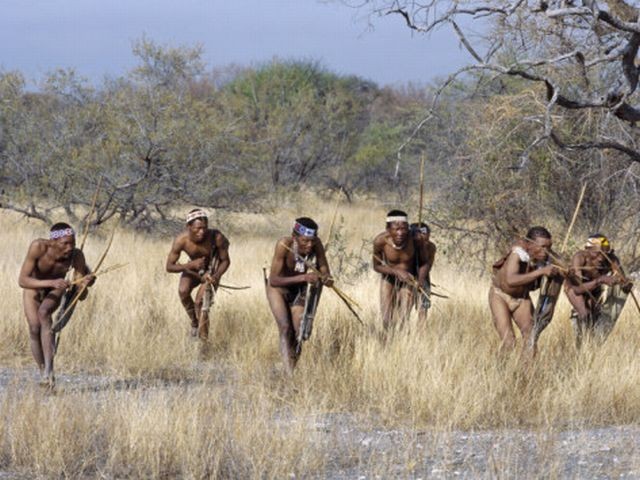Hunting and Gathering
Hunting and gathering refers to a system of securing food through the hunting of wild game and the gathering of roots or wild plants. Hunting may be an individual or group effort. One person may hunt using a bow and arrow or a simple trap, or a group of people may cooperate by chasing prey into a pit or net and then killing it. Gathering is largely an individual activity using a few basic tools, such as a sharpened stick for digging and sacks for carrying the food. The earliest human societies obtained their food by hunting and gathering.
Until recently anthropologists believed that hunting and gathering societies were very simple. They claimed that people in these societies did not have the ideas of property, trade, social status, and land ownership. All members of hunting and gathering groups were thought to possess the same skills, share land in common, own little or no private property, and have limited social contact with other groups. It seemed that hunting and gathering cultures lacked complex forms of social organization and relations. Anthropologists considered them “Stone Age” cultures that could be studied to gain an understanding of early human society.

Modern studies of hunting and gathering cultures have changed this image. Although the land used by hunting and gathering groups is typically owned by the community as a whole, individuals gain access to the land by a complex set of social relations. The right to use land is usually inherited, either through a person's own kin or through relations between kin and members of other groups. Land access rights may also be based on marriage and status. In many cases marriages are negotiated with relatives in other groups to strengthen a person's claim to land access.
Anthropologists now recognize that the individuals in hunting and gathering societies may own private property, such as weapons and tools. They exchange items with others through a system of social relationships. Often, desirable trading partners are linked by marriage. Goods pass from family members in one group to relatives in another, who may then exchange them with relatives in more distant groups. Such practices have shown that hunting and gathering peoples have complex societies with social ties that extend far beyond their immediate group. (See also Humans, Early.)